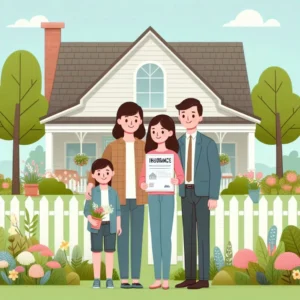Introduction
When it comes to home insurance, maintaining your property is crucial. One surprising factor that can lead to your insurer dropping your coverage is a dirty roof. Yes, you read that right! A dirty roof can signal potential problems that insurers want to avoid. In this article, we’ll dive deep into why a dirty roof affects your home insurance, the signs to watch for, and what steps you can take to keep your roof—and your coverage—in good standing.

Why Does a Dirty Roof Matter for Home Insurance?
It may seem trivial, but a dirty roof can raise red flags for insurance companies. Here’s why:
- Increased Risk of Damage: A dirty roof can indicate neglect. Over time, dirt, moss, and algae can lead to leaks or structural damage. Insurance companies may see this as a higher risk.
- Decreased Property Value: If your roof looks bad, it can lower the overall value of your home. Insurance companies factor this into your premiums.
- Claims History: If you’ve filed previous claims related to roof damage, a dirty roof might suggest that the issues are ongoing and unresolved.
Overall, insurers want to minimize their risk, and a dirty roof can be a significant concern for them.
Understanding Home Insurance Policies
Before we delve deeper, let’s briefly discuss how home insurance works. Home insurance is a contract between you and your insurer. You pay premiums, and in return, your insurer agrees to cover specific risks to your home. These risks can include fire, theft, vandalism, and certain types of water damage. However, your policy may have exclusions, such as lack of maintenance. This is where the condition of your roof comes into play.
How Insurers Evaluate Roof Condition
Insurance companies often perform a thorough evaluation of your home when determining your coverage and premiums. This evaluation can include:
- Roof Age: Older roofs may be more prone to damage and can lead to higher premiums.
- Material Quality: Different roofing materials have varying lifespans and durability, affecting your insurance costs.
- Visible Damage: Cracks, missing shingles, or any visible signs of neglect can lead to increased scrutiny from insurers.
- Maintenance History: Regular maintenance records can help demonstrate your commitment to keeping your home in good condition.
If your roof appears dirty or neglected during an evaluation, it could negatively affect your insurance status.
Signs of a Dirty Roof
Recognizing the signs of a dirty roof is the first step in preventing issues with your home insurance. Here are some things to look for:
- Moss or Algae Growth: Moss can hold moisture, leading to rot and structural problems.
- Stains or Discoloration: Dark streaks or stains can indicate water damage or mold.
- Debris Buildup: Leaves, twigs, and other debris can trap moisture, which may lead to damage.
- Visible Cracks or Damage: If you can see cracks or other types of damage, it’s time for a thorough inspection.
- Sagging Areas: Any part of the roof that appears to sag can be a significant warning sign of underlying problems.
If you notice any of these signs, it’s essential to take action quickly.

How a Dirty Roof Can Affect Your Home Insurance Premiums
Your home insurance premiums can be affected in several ways if your roof is dirty:
- Higher Premiums: If your insurer sees your dirty roof as a higher risk, they may increase your premiums.
- Dropped Coverage: In severe cases, insurers may choose to drop your coverage entirely, especially if you’ve previously made claims related to the roof.
- Claim Denials: If you try to file a claim for roof damage and the insurer finds that neglect played a role due to a dirty roof, they may deny your claim.
To understand how this works, let’s look at a hypothetical scenario:
| Situation | Outcome |
|---|---|
| Roof shows moss and algae | Premium increase by 15% |
| Roof has visible damage | Coverage dropped |
| Claim filed for water damage | Claim denied due to neglect |
Impact of Local Regulations and Climate
The location of your home can also influence how a dirty roof affects your insurance. In areas with heavy rain or snow, for instance, roofs may require more frequent maintenance. In places with high humidity, mold and algae can grow rapidly. These factors can lead to stricter requirements from insurance companies. Always check your local regulations regarding roof maintenance, as failure to comply can also lead to insurance issues.
What Can You Do to Maintain Your Roof?
Keeping your roof clean and well-maintained can help you avoid issues with your home insurance. Here are some actionable steps:
- Regular Inspections: Inspect your roof at least twice a year. Look for dirt, moss, or any signs of wear. Ideally, do this in the spring and fall.
- Professional Cleaning: Consider hiring professionals to clean your roof if you see significant buildup. This can help prevent further damage.
- Gutter Maintenance: Clean your gutters regularly to prevent water from pooling on your roof.
- Trim Overhanging Trees: Overhanging branches can drop debris onto your roof, encouraging the growth of moss and algae.
- Repair Damage Promptly: If you find any damage during your inspections, address it immediately. Delaying repairs can lead to larger, more costly problems.
By taking these steps, you can keep your roof in good condition and reduce the risk of issues with your insurance provider.
Understanding Insurance Exclusions and Clauses
When reviewing your home insurance policy, pay close attention to the exclusions and clauses related to roof maintenance. Here are some common clauses:
- Neglect Clause: Most policies include a neglect clause stating that if you don’t maintain your property, coverage could be denied.
- Roof Age Clause: Some insurers will not cover roofs older than a certain age without additional inspections or maintenance.
- Maintenance Requirement: Policies may explicitly state that homeowners are required to keep their roofs clean and in good repair.
Understanding these clauses can help you navigate your policy more effectively.
How to Handle Insurance Issues Related to a Dirty Roof
If your insurance company has informed you that your policy is at risk due to a dirty roof, don’t panic. Here’s what you can do:
- Document Everything: Take photos of your roof’s condition before and after cleaning. This documentation can help you if you need to appeal a decision.
- Communicate with Your Insurer: Contact your insurance company to discuss your options. They may provide a grace period for you to clean your roof.
- Get a Roof Inspection: If necessary, hire a professional to inspect your roof and provide a report. This can help convince your insurer that your roof is in good condition.
- Complete Necessary Repairs: If your insurer has noted specific repairs that need to be made, prioritize those to maintain your coverage.
Can You Appeal an Insurance Decision?
Yes, if your insurer drops your coverage due to a dirty roof, you can appeal their decision. Here’s how:
- Understand the Reason: Ask for a detailed explanation of why they dropped your coverage. This will help you identify what you need to address.
- Gather Evidence: Use your documentation, including photos and inspection reports, to demonstrate that the issues have been addressed.
- Submit a Formal Appeal: Write a letter to your insurer outlining your case and include all supporting documents. Be polite but firm.
- Follow Up: Stay in contact with your insurance company throughout the appeals process to ensure your case is being reviewed.
The appeals process can take time, so be patient and persistent.
Understanding Your Rights as a Homeowner
As a homeowner, it’s essential to know your rights regarding home insurance:
- Right to Appeal: You have the right to appeal decisions made by your insurer.
- Transparency: Insurers must be transparent about their policies and reasons for dropping coverage.
- Fair Treatment: You should be treated fairly and not discriminated against based on your roof’s condition alone.
- Access to Information: You have the right to receive clear information about what is required to maintain your policy.
Knowing your rights can empower you to advocate for yourself effectively.
When to Consider Switching Insurance Providers
If your current provider is unwilling to work with you or drops your coverage, it may be time to consider switching. Here are some indicators:
- Unfair Practices: If you feel your insurer isn’t treating you fairly, look for another company.
- Higher Premiums: If your premiums are consistently rising without justification, consider shopping around.
- Limited Coverage Options: If your provider doesn’t offer adequate coverage for your home’s needs, it may be time for a change.
- Poor Customer Service: If you’re having difficulty communicating with your insurer, it might be time to find a provider that values customer relations.
When shopping for a new insurance policy, be sure to disclose the condition of your roof and any steps you’ve taken to maintain it.
Preventive Maintenance: A Worthwhile Investment
Investing in preventive maintenance for your roof is crucial. Here are a few benefits:
- Cost Savings: Regular maintenance can save you money in the long run by preventing costly repairs and insurance issues.
- Improved Property Value: A well-maintained roof enhances the overall value of your home, making it more appealing to buyers if you decide to sell.
- Peace of Mind: Knowing your roof is in good condition can provide peace of mind and help you sleep better at night!
- Better Insurance Options: A clean and well-maintained roof can make it easier to find affordable insurance options.
Taking these steps helps you maintain a safe and secure home while protecting your investment.
Conclusion
In conclusion, a dirty roof can significantly impact your home insurance policy. By keeping your roof clean and well-maintained, you can prevent issues that could lead to increased premiums or even loss of coverage. If you find yourself facing challenges with your insurance provider, remember to document your efforts, communicate effectively, and know your rights. A proactive approach not only protects your roof but also secures your home’s insurance coverage. Don’t underestimate the importance of a clean roof—your home and wallet will thank you!
FAQs on Home Insurance Dropping Because of a Dirty Roof
- Can my home insurance drop if I have a dirty roof?
Yes, a dirty roof can signal neglect and lead insurers to increase your premiums or drop your coverage. - How often should I clean my roof?
It’s best to inspect your roof at least twice a year and clean it as needed, especially if you notice moss or debris. - What are the signs that my roof needs cleaning?
Look for moss, algae growth, discoloration, and debris buildup. - Can I appeal if my insurance is dropped due to my roof?
Yes, you have the right to appeal the decision and provide evidence of your roof’s condition after cleaning. - Should I hire a professional to clean my roof?
If the buildup is significant or you’re unsure how to clean it safely, hiring a professional is a wise choice.


